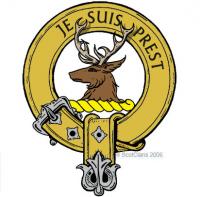
Clan Fraser of Lovat
Groups
Clan Fraser of Lovat People
James Baillie Fraser (1783-1856)
Fraser arrived in India as a merchant in 1813. He tracked down his brother William in the Nepal War and together they explored the lower Himalayas. James drew continuously as they travelled to the sources of both the Ganges and the Jumma.
His Journal, describing almost every flower, rock and native habit he found, was published in 1820 together with his collection of drawings “Views in the Himalaya Mountainsâ€. He also made acclaimed drawings of life in Calcutta before returning to Scotland via further recorded adventures in Persia.
Hugh Fraser and Sons
The name Fraser has developed a ring of regality with the aid of the high-class House of Fraser department stores. Hugh Fraser opened his first cash-only warehouse in Glasgow’s Buchanan Street in 1849. As Glasgow’s industrial wealth developed, so too did the fortunes of the store. In 1889, under Hugh Fraser II, new premises were built after a fire.
It was Hugh Fraser III who used promotion and modernisation to project the name into the premier retail bracket. His strategies were initiated in 1919, and in 1927 the store moved to Glasgow’s Argyll Street.
When Hugh died in 1966, he was a member of the House of Lords. The House of Fraser had stores across Britain and controlled Harrods and Barkers in London.
Peter Fraser (1884-1950)
From Fearn in Ross-shire Peter Fraser moved to London and joined the Independent Labour Party in 1908. In 1910, aged twenty-five, he emigrated to New Zealand. During the First World War he was imprisoned for protesting that men were conscripted.
In 1935 he became Minister of Education following Labour’s election victory. He became Prime Minister after the death of Michael Savage. He played a major part in the founding of the United Nations.
George Sutherland Fraser (1915-80)
Glasgow-born Fraser fought in the Middle East after the war, where his experiences would be transformed into his greatest poems.
His most famous work became “The Traveller Has Regrets†from 1948. Regret would be a consistent theme for him, as can be seen in his posthumous “Collected Poems†published in 1981.
Fraser arrived in India as a merchant in 1813. He tracked down his brother William in the Nepal War and together they explored the lower Himalayas. James drew continuously as they travelled to the sources of both the Ganges and the Jumma.
His Journal, describing almost every flower, rock and native habit he found, was published in 1820 together with his collection of drawings “Views in the Himalaya Mountainsâ€. He also made acclaimed drawings of life in Calcutta before returning to Scotland via further recorded adventures in Persia.
Hugh Fraser and Sons
The name Fraser has developed a ring of regality with the aid of the high-class House of Fraser department stores. Hugh Fraser opened his first cash-only warehouse in Glasgow’s Buchanan Street in 1849. As Glasgow’s industrial wealth developed, so too did the fortunes of the store. In 1889, under Hugh Fraser II, new premises were built after a fire.
It was Hugh Fraser III who used promotion and modernisation to project the name into the premier retail bracket. His strategies were initiated in 1919, and in 1927 the store moved to Glasgow’s Argyll Street.
When Hugh died in 1966, he was a member of the House of Lords. The House of Fraser had stores across Britain and controlled Harrods and Barkers in London.
Peter Fraser (1884-1950)
From Fearn in Ross-shire Peter Fraser moved to London and joined the Independent Labour Party in 1908. In 1910, aged twenty-five, he emigrated to New Zealand. During the First World War he was imprisoned for protesting that men were conscripted.
In 1935 he became Minister of Education following Labour’s election victory. He became Prime Minister after the death of Michael Savage. He played a major part in the founding of the United Nations.
George Sutherland Fraser (1915-80)
Glasgow-born Fraser fought in the Middle East after the war, where his experiences would be transformed into his greatest poems.
His most famous work became “The Traveller Has Regrets†from 1948. Regret would be a consistent theme for him, as can be seen in his posthumous “Collected Poems†published in 1981.









